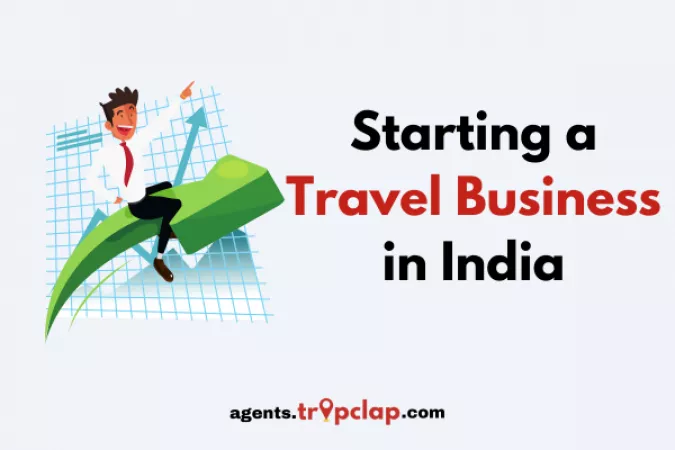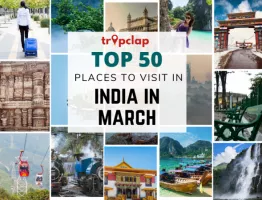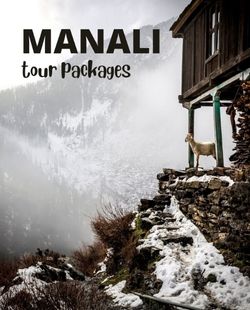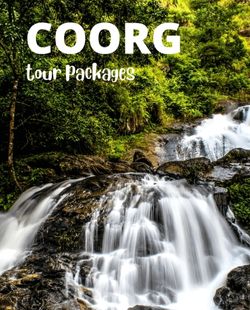Starting a Travel Business in India: A Comprehensive Guide | 2025
Embark on your entrepreneurial journey with our guide on starting a travel business in India. Get insights on market trends, setup, and growth strategies.

India's dynamic travel sector presents enticing opportunities for entrepreneurs. Embarking on a journey to establish a travel business in this culturally rich and diverse country can be highly rewarding. This comprehensive guide will navigate you through the steps and considerations essential for launching a successful travel business in India.
Understanding the Market
Market Research and Analysis:
- Assessing Demand: Begin with in-depth market research to grasp current trends, customer preferences, and demand across various travel industry segments. Resources like the Ministry of Tourism provide valuable insights.
- Identifying Your Niche: Choose a specific niche within the travel market, whether it be cultural tourism, adventure travel, or luxury tours. Understanding different travel motivations can guide this decision.
Analyzing Competition:
- Competitive Landscape: Examine your competitors to understand their strengths and weaknesses, and identify market gaps your business could fill. Analyzing successful travel businesses can offer practical insights.
- Learning from Success Stories: Investigate both Indian and global success stories in the travel sector for effective business models and strategies.
Legal and Regulatory Requirements:
- Registration and Licensing: Familiarize yourself with the legalities of starting a travel business in India, including business registration, GST, and other necessary licenses (Read in Details about Licenses & Certifications required for running travel agency here).
- IATA Certification: For businesses planning to offer air travel bookings, obtaining IATA certification can provide a significant advantage.
Understanding Consumer Behavior:
- Travel Preferences: Understand what drives different traveler types, such as cultural experiences, relaxation, or adventure.
- Adapting to Changing Trends: Stay adaptable to evolving travel trends, like the increasing interest in sustainable and eco-friendly travel.
Planning and Setting Up Your Travel Business
Business Planning:
- Creating a Business Plan: Develop a detailed business plan that outlines your business model, target market, marketing strategy, financial projections, and growth plan. This document will serve as a roadmap for your business and can be crucial for securing funding.
- Budgeting and Finance: Determine your startup costs, operational expenses, and potential revenue streams. Consider different financing options, including loans, investors, or self-funding.
Choosing the Right Business Model:
- Types of Travel Businesses: Decide on the type of travel business you want to establish. Options include a travel agency, tour operator, online travel portal, or a niche travel service.
- Franchise vs. Independent: Consider whether to start an independent business or buy a franchise of an established brand. Each has its own set of advantages and challenges.
Operational Setup:
- Office Location and Setup: Choose a location for your business. While online businesses might not require a physical office, having a well-located office can be beneficial for traditional travel agencies.
- Staffing and Training: Hire qualified staff and provide adequate training, especially in customer service and travel planning. Consider the roles you need to fill, including travel consultants, marketing personnel, and administrative staff.
Technology and Tools:
- Investing in Technology: Utilize the right technology and tools for booking systems, customer management, and marketing. This can include CRM systems, booking software, and digital marketing tools.
- Website and Online Presence: Develop a professional website and establish a strong online presence. Website and Online Presence: Elevate your travel business with a professional website crafted by our team with TripClap Travel Website Development Service. Our focus extends beyond aesthetics to include effective SEO strategies, engaging content marketing, and dynamic social media engagement, all integral to building a robust online presence.
Discover more about leveraging digital trends in travel to enhance your business's visibility and appeal.
Networking and Partnerships:
- Building Relationships: Establish relationships with travel suppliers, local tour operators, and other travel agencies. This network will be crucial for providing comprehensive services to your clients.
- Joining Associations: Consider joining travel industry associations for networking opportunities, industry insights, and credibility.
Marketing Your Travel Business and Customer Acquisition
Developing a Marketing Strategy:
- Understanding Your Audience: Tailor your marketing strategy to your target audience. Understand their preferences, behaviors, and the best channels to reach them.
- Branding: Develop a strong brand identity that resonates with your target market. This includes your business name, logo, tagline, and overall brand message.
- Digital Marketing:
- Website and SEO: Create a user-friendly website with an attractive design and informative content. Implement search engine optimization (SEO) strategies to improve visibility and attract organic traffic (learn more about SEO in travel).
- Social Media Marketing: Utilize social media platforms like Facebook, Instagram, and Twitter to engage with potential customers. Share engaging content, travel tips, destination highlights, and special offers.
- Email Marketing: Build an email list and regularly send newsletters, promotional offers, and personalized travel packages to potential and existing clients.
Offline Marketing Strategies:
- Networking Events: Attend travel expos, trade shows, and local business events to network with potential clients and partners.
- Print and Media Advertising: Depending on your target audience, consider traditional advertising methods like print ads, radio, or local TV channels.
Customer Acquisition Tactics:
- Referral Programs: Encourage word-of-mouth marketing through referral programs. Offer incentives for customers who refer new clients to your business.
- Collaborations and Partnerships: Collaborate with hotels, airlines, and local tour operators to create bundled travel packages and special deals.
- Loyalty Programs: Implement loyalty programs to retain existing customers by offering rewards, discounts, or exclusive deals on future bookings.
Measuring and Adapting:
- Performance Tracking: Regularly track the performance of your marketing efforts using tools like Google Analytics. This includes monitoring website traffic, engagement rates on social media, and the effectiveness of advertising campaigns.
- Feedback and Adaptation: Actively seek feedback from customers and adapt your strategies accordingly. Stay up-to-date with market trends and be ready to pivot your approach as needed.
Building Customer Relationships
Prioritizing Customer Service:
- Exceptional Service: Offer impeccable, personalized service to every client. Ensure that your team is trained to handle inquiries, bookings, and any issues with professionalism and empathy.
- Responsive Communication: Maintain clear, prompt, and effective communication with clients. This includes responding swiftly to emails, calls, and social media inquiries.
Creating Personalized Experiences:
- Tailored Packages: Customize travel packages based on individual preferences, budgets, and interests. This personal touch can differentiate your business in a crowded market.
- Feedback and Customization: Regularly collect feedback from clients post-travel and use this information to refine and personalize future offerings.
Leveraging Technology for Enhanced Experiences:
- CRM Tools: Implement customer relationship management (CRM) specifically designed for travel business tools to better understand and manage customer interactions and data throughout the customer lifecycle.
- Innovative Tools: Consider using innovative tools like virtual reality previews of destinations or AI-based itinerary builder to enhance customer engagement and satisfaction.
Engaging through Content and Community Building:
- Travel Blogs and Guides: Create and share engaging travel content, such as blogs, destination guides, and travel tips, to keep your audience informed and engaged (explore digital content strategies).
- Online Communities: Build online communities through social media or forums where travelers can share experiences and tips, fostering a sense of belonging among your clients.
Long-term Relationship Building:
- Loyalty Programs: Develop loyalty programs that offer rewards, exclusive deals, or special discounts to repeat customers.
- Post-Trip Engagement: Keep in touch with clients even after their trip. Send them personalized messages, updates on new offerings, or wishes on special occasions.
- Dealing with Complaints and Feedback:
- Effective Complaint Resolution: Address customer complaints promptly and effectively. View complaints as an opportunity to improve your services and customer satisfaction.
- Learning from Feedback: Actively seek and incorporate customer feedback into your business practices and offerings.
Building strong customer relationships is essential for the growth and sustainability of your travel business. By focusing on exceptional service, personalization, and continuous engagement, you can create a loyal customer base that not only returns but also recommends your services to others.
Scaling and Expanding Your Business
Evaluating Business Performance:
- Regular Assessments: Conduct regular assessments of your business performance. Identify areas of success and those needing improvement.
- Market Trends: Stay informed about the latest trends in the travel industry and adapt your business model to align with these trends.
Expanding Your Offerings:
- Diversification: Consider expanding your range of services or products. This could include adding new travel destinations, curating unique experiences, or offering complementary services like travel insurance.
- Technology Integration: Continuously upgrade your technology to improve customer experiences and operational efficiency. This could involve adopting new booking systems, virtual tour technologies, or mobile apps.
Growth through Partnerships and Collaborations:
- Strategic Partnerships: Forge partnerships with airlines, hotels, and local tour operators to offer more comprehensive services and competitive pricing.
- Collaborative Marketing: Collaborate with related businesses for co-marketing opportunities. This can help reach a broader audience and reduce marketing costs.
Exploring New Markets:
- Geographic Expansion: Look for opportunities to expand into new geographic markets. This could be within India or in international markets with a demand for Indian travel experiences.
- Targeting New Demographics: Identify and target new customer segments. For example, focusing on solo travelers, families, or corporate clients can open up new revenue streams.
Investing in Marketing and Brand Building:
- Enhanced Marketing Efforts: Invest in more advanced marketing strategies and tools. Consider digital marketing, content marketing, and SEO to enhance your online presence.
- Brand Development: Focus on building a strong brand that resonates with your target audience. Consistent branding across all channels can significantly impact customer perception and loyalty.
Staff Development and Training:
- Employee Training: Invest in regular training and development for your staff. This ensures that your team is skilled, motivated, and aligned with your business goals.
- Hiring for Growth: As your business grows, hire additional staff to support new areas of your business. Look for individuals who bring new skills and perspectives to your team.
Scaling Operations:
- Operational Efficiency: Streamline operations to handle increased business volumes efficiently. This might involve automating certain processes or restructuring your team.
- Financial Management: As you scale, keep a close eye on your finances. Efficient financial management is crucial for sustaining growth and profitability.
Sustaining and Innovating in the Long Run
Long-term Business Sustainability:
- Adaptability: The key to long-term success in the travel industry is adaptability. Stay flexible and ready to pivot your strategies in response to market changes, new technologies, and customer preferences.
- Sustainable Practices: Embrace sustainable and eco-friendly practices in your operations. This not only appeals to a growing segment of environmentally conscious travelers but also contributes to the responsible growth of the industry.
- Continuous Innovation:
- Embracing New Technologies: Keep abreast of emerging technologies that can enhance the travel experience, such as augmented reality (AR) for virtual tours or AI for personalized travel suggestions.
- Innovative Travel Experiences: Continuously seek ways to offer new and unique travel experiences. This could involve exploring untapped destinations, curating thematic tours, or integrating local cultural experiences.
Building a Strong Community:
- Engage with Your Audience: Foster a community around your brand. Engage with your customers through social media, forums, and events. Create a platform where travelers can share their experiences and tips.
- Customer Feedback Loop: Establish a continuous feedback loop with your customers. Use their insights and suggestions to refine your offerings and services.
Focusing on Quality and Value:
- Quality Services: Ensure that every aspect of your service remains top-notch. High-quality experiences lead to repeat business and referrals.
- Value Proposition: Always focus on providing value to your customers. Whether it’s through competitive pricing, unique packages, or exceptional service, make sure your customers feel they are getting value for their money.
Employee Growth and Development:
- Invest in Your Team: Your employees are your biggest asset. Provide ongoing training and development opportunities to keep them motivated and skilled.
- Create a Positive Work Culture: Foster a workplace culture that encourages innovation, teamwork, and employee well-being.
Monitoring Market Trends and Competitor Moves:
- Market Research: Regularly conduct market research to stay ahead of industry trends and understand evolving customer needs.
- Competitor Analysis: Keep an eye on your competitors. Learn from their successes and failures to refine your own business strategies.
By focusing on these key areas, your travel business can not only sustain its success but continue to grow and innovate in the long run. The travel industry is dynamic, and staying ahead requires a commitment to continuous improvement and adaptation.
Get a step closer to starting a successful travel business by registering with us on TripClap Agents Portal and avail our Travel Business Growth services of High Intent Travel Leads, Itinerary Builder for Travel Agents,Travel CRM and many more.

Gaurav Singh
I am a travel enthusiast and love to share my stories and experiences. I strongly believe that the places you visit becomes a part of your personality. I am also a marketer who loves to solve marketing problems. Delivering results is my core interest when it comes to social media marketing and content marketing.
Explore best popularTour Packages
Tripclap connects you with top travel agents
Compare Custom Quotes and get the best package deal
1
Trusted Network Of 8000+ Agents.
2
Book everything together, including stay & transport.
3
Compare agent profiles & verified reviews.
How It Works
Compare Custom Quotes from Top Travel Agents.

Tell us about your trip

Get Custom quotes from top agents.

Choose the package you like
Latest Destinations : -
• Deeg • Mandawa • Johor Bahru • Patan • Thrissur • Ganapatipule • Somnath • Kannur • Cameron Highlands • Pune • Jhunjhunu • Nong Khai • Kurukshetra • Goalpara • Miri • Vienna • Ponnani • Pithoragarh • Melbourne • Chanthaburi • Pangkor Island • Anantapur • Ambaji • Manikaran • Lolegaon • Kumbhalgarh • Mykonos • Gaumukh • Patiala • Hastinapur • Osian • Marrakech • Ramanagara • Sarnath • Auli • Bageshwar • Makarska • Nubra Valley • Seoul • Gwalior • Shillong • Chettinad • Yinchuan • Bangalore • Rameshwaram • Naggar • Dooars • Kundapur • Ooty • Kumta
• Deeg • Mandawa • Johor Bahru • Patan • Thrissur • Ganapatipule • Somnath • Kannur • Cameron Highlands • Pune • Jhunjhunu • Nong Khai • Kurukshetra • Goalpara • Miri • Vienna • Ponnani • Pithoragarh • Melbourne • Chanthaburi • Pangkor Island • Anantapur • Ambaji • Manikaran • Lolegaon • Kumbhalgarh • Mykonos • Gaumukh • Patiala • Hastinapur • Osian • Marrakech • Ramanagara • Sarnath • Auli • Bageshwar • Makarska • Nubra Valley • Seoul • Gwalior • Shillong • Chettinad • Yinchuan • Bangalore • Rameshwaram • Naggar • Dooars • Kundapur • Ooty • Kumta
Best Selling Domestic Tour Packages : -
Kashmir Tour Packages Andaman Tour Packages Kerala Tour Packages Shimla Tour Packages Manali Tour Packages Sikkim Tour Packages Uttarakhand Tour Packages Rajasthan Tour Packages Chardham Tour Packages Gujarat Tour Packages Rameswaram Tour Packages Gangtok Tour Packages Goa Tour Packages Jaipur Tour Packages Ooty Tour Packages Jim Corbett Tour Packages Mussoorie Tour Packages Kanyakumari Tour Packages Meghalaya Tour Packages Ladakh Tour Packages
Kashmir Tour Packages Andaman Tour Packages Kerala Tour Packages Shimla Tour Packages Manali Tour Packages Sikkim Tour Packages Uttarakhand Tour Packages Rajasthan Tour Packages Chardham Tour Packages Gujarat Tour Packages Rameswaram Tour Packages Gangtok Tour Packages Goa Tour Packages Jaipur Tour Packages Ooty Tour Packages Jim Corbett Tour Packages Mussoorie Tour Packages Kanyakumari Tour Packages Meghalaya Tour Packages Ladakh Tour Packages
Best Selling International Tour Packages : -
Dubai Tour Packages Bali Tour Packages Singapore Tour Packages Thailand Tour Packages Maldives Tour Packages Bhutan Tour Packages Vietnam Tour Packages Mauritius Tour Packages Nepal Tour Packages Europe Tour Packages Sri lanka Tour Packages Turkey Tour Packages Malaysia Tour Packages Azerbaijan Tour Packages
Dubai Tour Packages Bali Tour Packages Singapore Tour Packages Thailand Tour Packages Maldives Tour Packages Bhutan Tour Packages Vietnam Tour Packages Mauritius Tour Packages Nepal Tour Packages Europe Tour Packages Sri lanka Tour Packages Turkey Tour Packages Malaysia Tour Packages Azerbaijan Tour Packages
Certified
We accept (more)
Members of
Media Recognition
Trusted Partners
Award
Copyrights © TripClap. All Rights Reserved


 May
May June
June July
July August
August September
September October
October November
November December
December January
January February
February March
March April
April



























